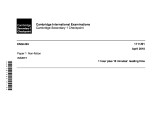|
Download [PDF] April 2018 CAIE P1 Questions 1111 English Cambridge Lower Secondary Checkpoint
|
File Information
| Filename: | [PDF] April 2018 CAIE P1 Questions 1111 English Cambridge Lower Secondary Checkpoint.pdf |
| Filesize: | 682.56 KB |
| Uploaded: | 16/03/2022 16:20:20 |
| Keywords: | |
| Description: | Download file or read online CAIE Cambridge lower secondary checkpoint past exam paper English 1111/01/A/M/18 April/May 2018 questions paper 1 - Cambridge Assessment International Education. |
| Downloads: | 190 |
File Preview
Download Urls
Short Page Link
https://www.edufilestorage.com/93c
Full Page Link
https://www.edufilestorage.com/93c/PDF_April_2018_CAIE_P1_Questions_1111_English_Cambridge_Lower_Secondary_Checkpoint.pdf
HTML Code
<a href="https://www.edufilestorage.com/93c/PDF_April_2018_CAIE_P1_Questions_1111_English_Cambridge_Lower_Secondary_Checkpoint.pdf" target="_blank" title="Download from eduFileStorage.com"><img src="https://www.edufilestorage.com/cache/plugins/filepreviewer/4794/pdf/150x190_middle_46f4e7862b1eb5bd4935adbbba5d79e8.jpg"/></a>
Forum Code
[url=https://www.edufilestorage.com/93c/PDF_April_2018_CAIE_P1_Questions_1111_English_Cambridge_Lower_Secondary_Checkpoint.pdf][img]https://www.edufilestorage.com/cache/plugins/filepreviewer/4794/pdf/150x190_middle_46f4e7862b1eb5bd4935adbbba5d79e8.jpg[/img][/url]
Related Files | 8
Download file
[PDF] April 2018 CAIE P1 Questions 1111 English Cambridge Lower Secondary Checkpoint [PDF]
[PDF] April 2018 CAIE P1 Questions 1111 English Cambridge Lower Secondary Checkpoint [PDF]
[PDF] April 2018 CAIE P1 Questions 1111 English Cambridge Lower Secondary Checkpoint.pdf | Plain Text
This document consists of 8 printed pages and 1 Insert. IB18 05_1111_01/5RP © UCLES 2018 [Turn over Cambridge International Examinations Cambridge Secondary 1 Checkpoint ENGLISH 1111/01 Paper 1 Non-fiction April 2018 1 hour plus 10 minutes’ reading time Candidates answer on the Question Paper. Additional Materials: Insert READ THESE INSTRUCTIONS FIRST Write your Centre number, candidate number and name on all the work you hand in. Write in dark blue or black pen. Do not use staples, paper clips, glue or correction fluid. DO NOT WRITE IN ANY BARCODES. Answer all questions. You should pay attention to punctuation, spelling and handwriting. At the end of the examination, fasten all your work securely together. The number of marks is given in brackets [ ] at the end of each question or part question. The total number of marks for this paper is 50.
2 © UCLES 2018 1111/01/A/M/18 Section A: Reading Spend 30 minutes on this section. Read Text A, an article about mountain climbing, in the Insert, and then answer questions 1–11. 1 How do the heading and subheading help to attract the reader’s interest? Comment on the presentation and content for each. (a) heading [1] (b) subheading [1] 2 Find a word in the first paragraph that means falling. [1] 3 How many climbers are there on the mountainside? [1] 4 Look at the second paragraph. Why does the narrator put a stake into the snow? Tick () one box. He thinks he’s going to fall. It gives him some reassurance. He needs some physical support. It allows him to remove his rope. [1]
3 © UCLES 2018 1111/01/A/M/18 [Turn over 5 Look at the first three paragraphs. Give three quotes about the wind. For each quote, explain how the wind affects the actions of the climbers. quote effect quote effect quote effect [3] 6 Who takes over from the narrator to lead the climbers? [1] 7 Look at the third paragraph. (a) Which word does the writer use to suggest a place that is high up and lacks space? [1] (b) Which verb does the writer use to suggest caution? [1] 8 Look at the fifth paragraph. Content removed due to copyright restrictions. [1]
4 © UCLES 2018 1111/01/A/M/18 9 Look at the fifth paragraph. Choose the correct option to complete the sentence below. Tick () one box. Content removed due to copyright restrictions. [1] 10 (a) Give a simile from Text A. [1] (b) Explain the simile in your own words. Give two details. [2] 11 What is the main theme of Text A? Tick () one box. the challenges of mountaineering the role of teamwork when climbing the importance of good climbing equipment the need to predict the weather in the mountains [1]
5 © UCLES 2018 1111/01/A/M/18 [Turn over Read Text B, an extract from a website, and then answer questions 12–14. 12 Identify three features of Text B that make it persuasive. Give a quote from the text for each feature. [3] 13 Make a list of the differences between an ice climbing holiday and a rock climbing holiday. [3] 14 Write a summary of up to 50 words about the difference between an ice climbing holiday and a rock climbing holiday. Include all the points from your list. Use your own words as much as possible. [2]
6 © UCLES 2018 1111/01/A/M/18 Section B: Writing Spend 30 minutes on this section. 15 Some people believe that dangerous sports like rock climbing should be banned. Do you agree? Write an essay giving your opinion. Things to consider: examples of dangerous sports reasons why some people take part in dangerous sports reasons why some people feel dangerous sports should be banned. Space for your plan: Write your essay on the next page. [25 marks]
7 © UCLES 2018 1111/01/A/M/18 [Turn over
8 Permission to reproduce items where third-party owned material protected by copyright is included has been sought and cleared where possible. Every reasonable effort has been made by the publisher (UCLES) to trace copyright holders, but if any items requiring clearance have unwittingly been included, the publisher will be pleased to make amends at the earliest possible opportunity. To avoid the issue of disclosure of answer-related information to candidates, all copyright acknowledgements are reproduced online in the Cambridge International Examinations Copyright Acknowledgements Booklet. This is produced for each series of examinations and is freely available to download at www.cie.org.uk after the live examination series. Cambridge International Examinations is part of the Cambridge Assessment Group. Cambridge Assessment is the brand name of University of Cambridge Local Examinations Syndicate (UCLES), which is itself a department of the University of Cambridge. © UCLES 2018 1111/01/A/M/18









